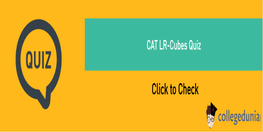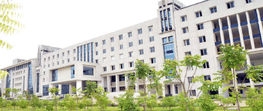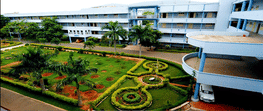Dr.Dayananda Siddavattam brings rich experience as a distinguished senior academician, mentor, researcher, and professional leader to his appointment as Vice-Chancellor, of GITAM (Deemed to be University). He started his teaching and research career after completing his Ph.D. from SV University, Tirupati. He won prestigious the DAAD (1988-90) and BMFT visiting cientist fellowships (1992-93) from the Ministry of Science and Technology, Federal Republic of Germany. In recognition of his research contributions, the state of Andhra Pradesh elected Prof Dayananda Siddavattam as the Scientist for 2008. British Council, UK awarded him Commonwealth Academic Staff Fellowship. He is an elected Fellow of all three leading Science Academies of India, the National Academy of Sciences, Allahabad, Indian Academy of Sciences, Bangaluru, and the Indian National Science Academy, New Delhi. The Science Engineering Research Board (SERB), Ministry of Science and Technology, Govt. of India, awarded him the prestigious JC Bose National Fellowship.

You have held key positions in various prestigious organizations throughout your career, What is something about GITAM that excited you to walk with the institution on the journey?
I was at the University of Hyderabad as Dean School of Life Sciences. The University of Hyderabad is one of the top-ranking universities in research. I decided to come to GITAM for reasons. This is one of those privately funded universities, which has all disciplines like medical sciences, pharmacy, humanities, social sciences, business studies, etc. If you look at most private universities, they start with engineering college and end up with management, because these are the two programs are the ones which bring revenue to them, but GITAM is not such an institute and it promotes all disciplines, irrespective of market demand. I believe in multi-disciplinary in all settings, I, therefore, decided to come to give the necessary leadership to boost multidisciplinary academic activities.
What is your main emphasis, to make GITAM stand out and be excelling in all ways compared to all the other existing institutions in the state?
Any university for that matter, which was established traditionally, promoted a uni-disciplinary culture. Our aim at GITAM is to promote multidisciplinary teaching as well as research that is going to places ahead of all conventional universities. And if we excel in these, which will take time, we will reach our dream which is total reach to the global stage. We believe in doing things in GITAM Style, which is the multi-discipline approach. And if we do our things sincerely We reach where we desired to. We don’t see anybody as a competitor. We believe in creating a style of your own and keep working, and at the end of the day you will reach there.
How would you balance the needs of different stakeholders, including faculty, students, alumni, donors, and the community, to ensure the university’s success and positive impact? And What is the leadership style you implement in the organization?
The first important thing is to have a common agenda and common goal. For example, if we are a faculty, you our goal is to give the best quality teaching and research. For a student, the goal is to get enriched, get empowered by the knowledge that the faculty is giving. The knowledge should empower you and ignite your innate wisdom. When you have a ground goal, though everyone is coming with a different purpose the objective of everyone is the same. There is less chance for conflicts. Everyone including support staff, Administration, and Vice Chancellor, are facilitators. We do and believe in feudalistic or bureaucratic principles. We respect everyone and everyone respects their job, this kind of mutual respect, makes us united and work for a common goal.
Check GITAM Visakhapatnam Courses & Fees
What are the norms or the particular strategies you follow when you’re hiring a faculty into the organization?
We have recently designed our four-year multidisciplinary liberal arts liberal science and Business Studies programs. We brought the best of the best faculty from all across the country to design our curriculum. This curriculum was again placed before the Board of Trustees for their brainstorming and to do fine-tuning. During that time, we map the curriculum we currently have and what is the latest content that is required for a graduate student. We analyze the strengths that we have in-house and our deficiencies. With this approach, we look for professionals who are experienced in those areas, we bring them and we interact with them they present their work to us. So that way, we know what are the human resource available and where the deficiencies are there.
We are in a time when the dynamics of education and industries are rapidly changing. How would you ensure that the appropriate required changes are incorporated into the curriculum of the programs offered by the institution?
We have four important components in our curriculum, one is the university core which is for 17 credits. We have unique courses here, everyone who enters GITAM should study Gandhian values irrespective of course and also everyone who enters GITAM need to learn To program irrespective of the program or domain you are in. We have a university core and then you we multidisciplinary programs. We are bringing world-class lectures, Collaborating with online platforms like Coursera. We have purchased 10,000 licenses. In the multi-disciplinary they can take an insert, we are giving some kindness. Our faculty coordinators will be accessing the progress of their online lectures. But I believe These online technology tools are never a substitute for a good teacher.
As you are an individual who is deeply involved in a lot of research work and received prestigious awards for your contribution, How do you provide support and push the research and scholarly activities among the faculty and students within the university?
GITAM has its research policy and at the same time Bringing a research culture into a traditional university is a big challenge. Our nation is traditionally an agrarian economy and now is going into a service-oriented economy. But if you want to become a world economic power, you need to generate something which the rest of the countries don't have, and where you can commercialize it make money. So, if you want to create an economy that is rich in knowledge, you need to strengthen your colleges and universities and strengthen their research. We are here at GITAM building our research base infrastructure and We never consider faculty as employees, faculty is our asset. We have to invest in the knowledge resource, and this resource will attract international recognition.










![Indian Institute of Petroleum and Energy - [IIPE]](https://image-static.collegedunia.com/public/college_data/images/appImage/16002398760336.jpg?h=111.44&w=263&mode=stretch)





![Anil Neerukonda Institute of Technology & Sciences - [ANITS]](https://image-static.collegedunia.com/public/college_data/images/appImage/1591266477Cover.jpg?h=111.44&w=263&mode=stretch)

![Vignan's Institute of Information Technology - [VIIT]](https://image-static.collegedunia.com/public/college_data/images/appImage/19177_5.jpg?h=111.44&w=263&mode=stretch)

![Andhra University College of Engineering for Women - [AUCEW]](https://image-static.collegedunia.com/public/college_data/images/appImage/28410_ANUCEW_APP.jpg?h=111.44&w=263&mode=stretch)













![GITAM School of Architecture - [GSA]](https://image-static.collegedunia.com/public/college_data/images/logos/1741581880GITAMLOGO.png?h=72&w=72&mode=stretch)
![GITAM Dental College & Hospital -[GDCH]](https://image-static.collegedunia.com/public/college_data/images/logos/1761905534dentallogo.webp?h=72&w=72&mode=stretch)







![Gitam Institute of Medical Science & Research - [GIMSR]](https://image-static.collegedunia.com/public/college_data/images/logos/1732968602gimsrlogo.jpg?h=72&w=72&mode=stretch)



.png?h=72&w=72&mode=stretch)



.png?h=72&w=72&mode=stretch)
.jpeg?h=72&w=72&mode=stretch)
.png?h=72&w=72&mode=stretch)
.png?h=72&w=72&mode=stretch)
.png?h=72&w=72&mode=stretch)





![Vignan's Institute of Information Technology - [VIIT]](https://image-static.collegedunia.com/public/college_data/images/logos/148007135655.jpg?h=72&w=72&mode=stretch)
![K L University - [KLU]](https://image-static.collegedunia.com/public/college_data/images/logos/1619098261Logo.jpg?h=72&w=72&mode=stretch)
![Sagi Ramakrishnam Raju Engineering College - [SRKR ]](https://image-static.collegedunia.com/public/college_data/images/logos/1697801139logo1.png?h=72&w=72&mode=stretch)
![GMR Institute of Technology - [GMRIT]](https://image-static.collegedunia.com/public/college_data/images/logos/1479966276logo.png?h=72&w=72&mode=stretch)
![Andhra University - [AU]](https://image-static.collegedunia.com/public/college_data/images/logos/1394863829Andhra University (AU).png?h=72&w=72&mode=stretch)
![Aditya Engineering College - [AEC]](https://image-static.collegedunia.com/public/college_data/images/logos/1591109396Annotation20200602201850.jpg?h=72&w=72&mode=stretch)

![Raghu Engineering College - [REC]](https://image-static.collegedunia.com/public/college_data/images/logos/1480399520newnew logo.jpg?h=72&w=72&mode=stretch)
![VIT University - [VIT- AP]](https://image-static.collegedunia.com/public/college_data/images/logos/1615969516Screenshot20210317134244.png?h=72&w=72&mode=stretch)
![Centurion University of Technology and Management - [CUTM]](https://image-static.collegedunia.com/public/college_data/images/logos/16190002297038315326908908642635764348829995527831552n.jpg?h=72&w=72&mode=stretch)
![Mohan Babu University - [MBU]](https://image-static.collegedunia.com/public/college_data/images/logos/1650533803logo200.png?h=72&w=72&mode=stretch)
![Anil Neerukonda Institute of Technology & Sciences - [ANITS]](https://image-static.collegedunia.com/public/college_data/images/logos/1591266477Logo.jpg?h=72&w=72&mode=stretch)

![Andhra University, College of Engineering - [AUCE]](https://image-static.collegedunia.com/public/college_data/images/logos/1756446694Header.png?h=72&w=72&mode=stretch)

Comments